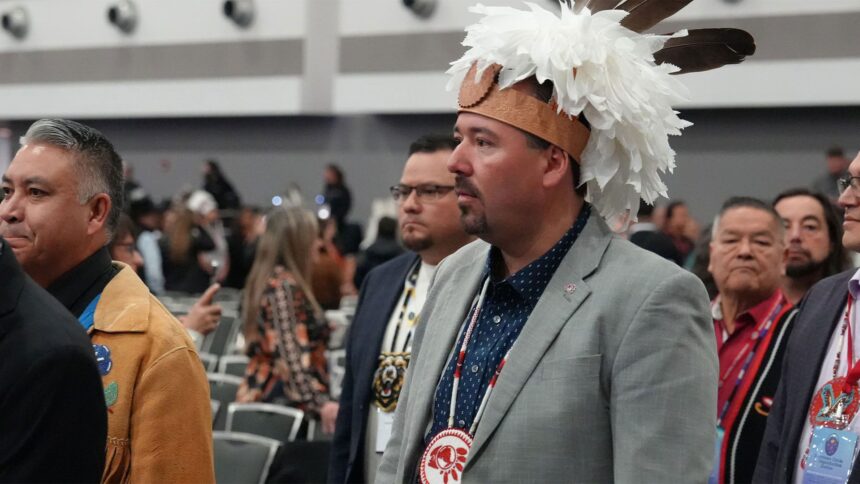Two grand chiefs in Ontario are calling on Prime Minister Mark Carney to reconsider his approach to fast-tracking Bill C-5, a sweeping piece of legislation that would reshape both infrastructure development and interprovincial trade in Canada. “The governments want to speed up processes, they want to speed up development, but this is not how to do it,” said Abram Benedict, at a news conference in Ottawa on Monday where he also emphasized that First Nations are not opposed to development—but insist that meaningful consultation must be a prerequisite. Benedict also issued a clear warning that attempting to sidestep Indigenous rights will backfire. “We will use the courts to slow down, to ensure that the rights holders are heard, that the government does what is right and has the First Nation rights holders at the table from the beginning.” Officially titled One Canadian Economy: An Act to Enact the Free Trade and Labour Mobility in Canada Act and the Building Canada Act, Bill C-5 aims to fast-track major projects deemed to be in the “national interest.” But First Nations leaders say the bill was drafted and tabled without proper consultation and threatens to undermine Indigenous rights. “Our Anishinabek Nation First Nations have not been consulted on this bill appropriately or adequately,” said Linda Debassige, grand council chief of the Anishinabek Nation. “This bill presents serious concerns that, in our view, creates a path forward for any government to create legislation that undermines the rights and interests of our First Nations people.” The press conference came just ahead of the bill’s initial vote in the House of Commons where it passed first reading with 307 votes in favour and 39 opposed. The Assembly of First Nations (AFN) is holding a virtual meeting today to coordinate a response to the proposed legislation that Carney says he wants passed before July 2. The AFN is expected to provide a legal analysis to present to chiefs during the meeting. Cross Lake Chief David Monias (blue shirt) with some of the firefighters protecting his community on May 28. Photo: Facebook Chiefs were given only a briefing note on the bill and one week to respond—without being shown the draft legislation before the bill was introduced. Bill C-5 does two key things, it removes interprovincial trade barriers but also creates the government’s ability to fast-track large-scale infrastructure and energy projects—such as mines, pipelines, ports, highways, and nuclear facilities. If such a project is deemed to be in the national interest by Cabinet, it would proceed through a streamlined “single window” process, overseen by a federal minister. Cabinet would have broad authority to allow such projects to bypass regulatory hurdles. David Monias, chief of Pimicikamak Cree Nation in Manitoba said he was one of the people the Prime Minister’s Office provided with the document. “I did get the email but I wasn’t paying much attention to it because I was too busy trying to help my people at the same time. So it was wrong timing, I think, for us,” Monias told APTN News Daytime’s Creeson Agecoutay. “We’re not against development, but it’s, it’s kind of concerning because it doesn’t dig into the treaties that we have and the fast tracking the whole system where you’re not going to have free, prior and informed consent from the First Nations. “I think they could have waited a little bit longer to be sure that we are ready to go and make sure they involve us.” While the bill does acknowledge a duty to consult Indigenous peoples if their rights “may be adversely affected,” it does not define how that consultation must occur. There is no requirement to consult on the creation of the national interest project list unless impacts on rights are explicitly triggered. “ I’ve never seen a bill like this and I’ve never seen a process to push it through so quickly… You could call it the big beautiful bulldozer Bill,” said Green Party leader Elizabeth May. Bill lacks oversight, could have ‘catastrophic consequences’ on threatened species Josh Ginsberg, the director, Ecojustice Environmental Law Clinic, also warned that the bill grants cabinet sweeping authority to exempt projects from important environmental laws, including laws that protect threatened species. “ Under this bill, the government could be compelled to approve activities causing that kind of harm, even if science warns of catastrophic consequences,” said Ginsberg. “The legislation also empowers ministers to override laws passed by parliament through what we lawyers call a Henry VII clause, which is an extraordinary mechanism that concentrates decision-making authority in the executive and weakens democratic oversight.” Continue Reading
First Nations leaders urge Liberals to rethink controversial One Canadian Economy Act

Leave a Comment










